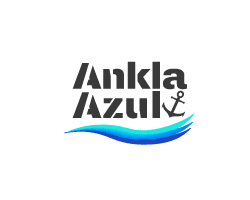We had a dream
In 2018 Ankla Azul started its operation in Bahía Solano with the vision of showing people the wonders that lie underneath the mysterious waters of the Eastern Tropical Pacific ETP: a world dominated by sea fans, colorful fishes, challenging currents, and scattered but healthy colonies of cauliflower corals. However, over the years we have witnessed a decline in coral coverage: colonies being dislodged by ghost fishing lines, healthy fragments of coral slowly dying rolling on the sandy bottoms. These sad images awoke our desire to actively participate in coral conservation, and at this point, our dream began.
During the past years, we have been removing ghost fishing lines and nets tangled in coral colonies and we have been relocating broken fragments into holes and cracks we find on the rocks, hoping they will reattach to the substrate and thrive again. We also realized that some of our diving stops are more affected than others. For example one of our most visited site, known as El Bajo, has very few broken colonies, medium live coral coverage, and a lot of suitable substrate for corals to grow. This place is rarely affected by ghost lines and is sheltered from other impacts such as anchorage and overfishing.
After careful consideration and a lot of thinking, we realized that the best way to protect the corals and promote ecosystem recovery was to start a coral nursery and engage in a small-scale coral restoration project, the first in Bahía Solano, and one of the few lead by a dive center. The year 2022 came and our dream was close to becoming a reality. New members, interested in the idea of starting a coral nursery joined the Ankla Azul team, including passionate naturalists, experienced dive instructors, and marine biologists, and we started sharing and combining our thoughts and ideas.
For the past decades, coral species around the world have been widely affected by increasing sea temperatures, pollution and intense and prolonged climatic events. Some places have recorded up to 95% of coral loss during the past two decades, and surviving colonies have been faced with the challenge of quickly adjusting to the current sea conditions, making them more susceptible to diseases.
Branching colonies in the Eastern Tropical Pacific (ETP) have deteriorated drastically in the last decades, being the branching corals from the genus Pocillopora the worst affected. Pocilloporas, commonly known as cauliflower of brush corals, are the main reef builders in the ETP region and play a key role in maintaining productivity and biodiversity in the ecosystem.
Reports from 2002 and then 2008 show that in Utría National Park live coral coverage has declined form 85% to 35%, with the most common threats listed as high temperatures and disease outbreaks as well as coastal development, uncontrolled natural resource extraction and massive tourism. Up to date there are no published data on the state of the corals in Bahía Solano, located just up north from Utría.
Team Work
Finally, on 17 October 2022 started our new conservation project: we built our first coral tree nursery able to grow 60 coral colonies. We realized that stocking our nursery fragmenting recently dislodged coral colonies would be the best to give those colonies a second chance to survive and thrive. So we collected a fragment of opportunity from Cotudo, a dive spot that severely affected abandoned fishing lines and with numerous broken cauliflower colonies. These colonies were then taken to the boat in a bucket and fragmented into 6 cm pieces that were then stocked into the nursery.
We decided that El Bajo was the perfect place to locate our pilot nursery: low anthropogenic impacts, sheltered sandy patch not too close to reef-building corals, and low sedimentation. Besides the environmental benefits, El Bajo is one of our popular diving spots, which will allow divers to admire our beautiful project whenever they join us for a fun dive in this wonderful place.
By placing coral fragments in a nursery we can enhance their growth by eliminating competition for space, reducing predation, and maximizing light exposure. Our little fragments need to reach a minimum size of 15 cm width/height before being transplanted back to the reef, and hopefully, this will happened in the next 4 to 6 months. For now, our duty is to maintain the nursery clean to avoid the excessive growth of algae that can affect our corals, and also get rid of all the extra weight (biofouling) on the nursery structure to avoid structural damage.
Hopefully, this is the first of many nurseries to come. At this point, we feel satisfied with what we have accomplished and we feel optimistic about the future, but only time will tell. By documenting the coral growth and the beauty of our coral tree nursery we hope to engage the local community in this project and witness how our dream becomes part of Bahía Solano’s story and inspires other dive centers to engage in active conservation.
All of this wouldn’t be possible without the support of our incredible Ankla Azul coral team! Nicolas, thanks for all your ideas, and videos and for being part of this since it was only a dream. Thanks to Federico for believing in this dream and being part of it. We want to thank Sonia for helping out in the construction and stocking of the nursery. Fish, thanks for wanting to be a part of this and sharing your passion with us. Thanks to Anyeli for her support and for being our camera lady on land. Also thanks to Deimar and MacGyver for their support on the boat.
Nicolas
Underwater Photografer
Diving Instructor
Camila
Marine biologist
Dive Master
Jalvan
Founder
Diving Instructor
Federico
Diving Instructor
Miguel
Anthropologist
Dive Master
Anyeli
Secretary
Video Documentary
Message Us
Phone
+57 (311) 281-1079
we use WhatsApp too
Email Address
Contact@anklaazul.com


